
40 Key Word Transformations Ex. | B2 First (FCE)
Tommy said he was ready for his driving test and would take it in July. Tommy said he was ready for his driving test and could take it in July.
One letter has been changed, from “would” to “could” but it changes the meaning of the sentence totally. Be careful of this!
A good way to practise this part of the FCE exam is to get used to writing and re-writing sentences using different structures and without changing the meaning.
(FCE) 40 Key Word Transformation: Exercises
Key word transformation: exercises 1.
Complete the sentence so that it has a similar meaning. Do not change the word given . You must use between two and five words , including the word given.
Nobody paid ATTENTION to ( ATTENTION ) his bad behaviour.
You should try and take advantage of his help.
You should try and (MOST) help he gives you.
My sister was involved in her school spelling competition.
My sister (PART) spelling competition.
Could they grow anything here after the war?
Were (ABLE) here after the war?
‘Why didn’t you call me?’ asked Joe.
Joe (ASKED) not called him.
Driving that fast was a stupid thing to do.
If (ONLY) driving so fast.
I hadn’t seen my sister for about a year, when I saw her last.
About (GONE) before I saw my sister again, after the last time I saw her.
Key Word Transformation: Exercises 2
I don’t earn anything like the amount I did before.
I earn (NOWHERE) as I did before.
The date for the Barcelona Conference is the 23rd of March.
The Barcelona Conference (PLACE) the 23rd of March.
The house was not very attractive in appearance when we first saw it.
The house was (MUCH) at when we first saw it.
No-one wants to buy this type of music any more.
There (LONGER) for this type of music.
Looking back, I think I was right to study mathematics at university.
Looking back, I (REGRET) mathematics at university.
Our spending will have to be reduced next year.
We will have (BACK) our spending next year.
Key Word Transformation: Exercises 3
While we were going home yesterday we got caught in a thunderstorm.
We got caught in a thunderstorm while we were (WAY) yesterday.
Has Mary altered her decision about moving to the countryside?
Do you know if Mary (MIND) about moving to the countryside?
I’d like Kevin to stop telling me what to do.
I (WISH) telling me what to do!
‘Are you pleased it’s nearly half-term?’ said the teacher to us.
The teacher wanted (KNOW) pleased it was nearly half-term.
We are earning less than we are spending, I’m afraid.
Our (EXPENDITURE) our income, I’m afraid.
I don’t think having luxuries in life is necessary.
I don’t (NECESSITY) having luxuries in life.
Key Word Transformation: Exercises 4
I am starting to find watching television boring.
I am beginning to get (FED) television.
Bad weather makes me feel really unhappy in the winter.
Bad weather (DOWN) in the winter.
Fog delayed my flight to Moscow this morning.
My flight to Moscow (UP) this morning
Help was urgently needed in the flooded area of the country.
They were (NEED) in the flooded area of the country.
I went to Italy with the intention of learning Italian.
I went to Italy (THAT) Italian.
Remember to return the videos you have rented.
Don’t (BACK) the videos you have rented.
Key Word Transformation: Exercises 5
To tell the truth, we need a swimming pool for this school.
To tell the truth, (WHAT) a swimming pool for this school.
Do you know whose this umbrella is, by any chance?
Do you know (BELONGS) , by any chance?
Was it Paul’s idea to go to the cinema?
Was it Paul (CAME) the idea of going to the cinema?
The boats began to move slowly out of the harbour.
The boats slowly (WAY) out of the harbour.
One runner did not succeed in finishing the race.
One runner (ABLE) the race.
It is not my fault that the glass broke.
You cannot (BLAME) the glass.
Would you pass B2 First (FCE)?
B2 first (fce) use of english part 4: tips & strategy.
You must complete a new sentence that has a similar meaning. You use a word in capitals given in bold for each sentence, which you must not change.
- Read the sentence carefully and think about its exact meaning.
- Check your tenses – if the first sentence is in the past tense, the second should be, too!
- Contractions (e.g. haven’t) count as two words.
- Try to keep the same meaning – If the first sentence says ‘Tom said…’ then don’t write ‘He said…’ in the second sentence. (Write ‘Tom said’.)
- Write between two and five words , including the word given.
Find things that are the same in both sentences and delete them. That helps you to focus on what you actually need to be transforming.
Because of the scoring system, it’s possible to get 50% in this section without getting any of the questions 100% correct. So it’s worth answering every question! Even incomplete answers can get points
Make absolutely sure that the two sentences mean the same thing. For example, if the sentence to transform has names in it, the answer will have to have them too.

Cambridge B2 First
B2 First - Key Word Transformations Exercise 1
In these exercises, you need to take the information in the first sentence and re-write it, using the word in bold so that the second sentence has exactly the same meaning. You cannot change the word in bold in ANY way. You must use a minimum of TWO and a maximum of FIVE words for each space. Contractions, which count as two words, should only be used for negatives: e.g. don't / hadn't / wouldn't, etc.
1. Many people think Steve stole the money. believed Steve the money.
2. The strong winds blew down the two ancient trees during the storm. blown The two ancient trees the storm.
3. He doesn't have enough money to buy the computer. too The computer to buy.
4. "You should start a new hobby, Mr. Jenkins", the doctor said. take The Doctor advised a new hobby.
5. We have been waiting here since half past ten. for We have been waiting one hour.
6. The man suddenly realised that the neighbor was watching him. watched The man suddenly realised that he the neighbor.
7. I could never have passed that exam without your help. you I could never have passed that exam me.
8. We paid some people to landscape the garden for us last year. had We last year.
- Key Word Transformations
- B2 First
- ##PLACEHOLDER1##
- ##PLACEHOLDER2##
- iOS/Android App
- First Words
- Grammar Guide
- Pre-Intermediate
- Intermediate
- Grammar Exercises
Reading Exercises
Listening exercises.
- Business English
Vocabulary Exercises
- Picture Quizzes
- NEW B1 Preliminary
- C1 Advanced
- C2 Proficiency
- Phrasal Verbs
- Phrasal Verbs Definitions
Pronunciation
- Pronunciation Exercises
Español / Castellano
- Aprender Español
- Learn Spanish

FCE Key Word Transformations Practice
On the Cambridge FCE Reading and Use of English exam, there are seven parts. Today you will learn about and practice Part 4 – Key Word Transformations . Many students think this part of the exam is challenging, but it just takes strategy and practice !
Post Contents
How to do Reading and Use of English Part 4
To begin, in part 4 each question has a sentence and a key word in BOLD . You must use this key word to complete the gap in a second sentence so its meaning is as close as possible to the first sentence.
You MUST use the key word in your answer. You CAN’T CHANGE the key word. For example, if the key word is “ WRITTEN ,” you cannot use the word “ wrote ” in your answer.
Use between 2 and 5 words . ** Contractions count as TWO WORDS! For example, won’t = will not . If you are unsure, always write out the entire word.
Use a pencil for this test. Write your answers in CAPITAL LETTERS only.
There are 6 questions total in this part. You can earn up to 2 points for each question.

What grammar structures and vocabulary does part 4 test?
This part of the FCE exam tests different grammar structures and vocabulary. Here are some of the most common ones that appear on the exam.
If you are taking a course , these structures and vocabulary should be covered by your teacher. If you are studying on your own , make sure you know the rules for each one.
Passive Verb patterns Conditionals Reported speech Future forms Future time clauses Causative – have/get Verb tenses – especially perfect forms Wish and other hypotheticals
Phrasal verbs Set expressions Words like height, weight, length, width Linking words Word forms
Example Key Word Transformation and Strategy
Look at the example question below:
He tried to keep running although he felt tired.
He tried to keep running _____________________________ tired.
Step One: Cross out words that are the same.
He tried to keep running _____________________________ tired .
First, I cross out any words that are EXACTLY THE SAME in both sentences.
Step Two: Focus on the remaining words and try to find the grammar or vocabulary rule.
He tried to keep running although he felt tired .
I need to focus on although he felt. Although is a linking word of contrast. This is the structure that I have identified.
Next, I start to think about other linking words and expressions of contrast while keeping in mind that I need to use the word SPITE .
Step Three: Choose your answer between 2 and 5 words.
In spite of and despite are both linking words/expressions of contrast. Remembering that I have to use the EXACT KEY WORD , I decide not to use despite.
Now, I remember that after in spite of I need a verb + ing form of the verb . So, I look at my original sentence and identify the verb “felt.”
Change the subject + verb in the original sentence to a verb + ing form to fit the second sentence.
My answer is IN SPITE OF FEELING .
Step Four: Check your answer. Did you use the key word? Do you have the correct word count? Did you write your answer in CAPITAL LETTERS?
He tried to keep running IN SPITE OF FEELING tired .
Finally, I need to check my answer.
- Key word SPITE? Yes.
- Correct word count? 4 words, yes.
- Capital letters? Yes.

Common mistakes on FCE Key Word Transformations
- Changing the key word – you MUST use the exact word
- Using too many words – maximum of 5 words
- Spending too much time – if you don’t know the answer, take a guess and continue with the next question
- Pronoun gender and agreement- if the first sentence uses a name, try to use the name in your second sentence. Sometimes you will need to use “her / his / she / he” etc. in your answer – make sure it matches the gender in the first sentence
- Subject-verb agreement – make sure your subject and verb match. For example, “she is singing” not “she are singing”
- Writing sentences that are too different – try to use the same words where you can when possible (words like very, really, etc. that appear in the first sentence). Make sure these are expressed in the second sentence as well.
FCE Key word Transformations Practice
Try these 10 key word transformations. Use the steps from above to help you and check your answers at the end of this post.
1. It’s a pity we don’t have a warmer climate!
If _____________________ a warmer climate!
2. Someone is going to redecorate our terrace for us next week.
We are going to _________________________________ next week.
3. I will only bring a jacket if it rains.
I will _________________ it rains.
4. They found the ring when they were fixing the garden.
They ____________________________ when they were fixing the garden.
5. I regret not selling my house sooner.
I wish _______________________ my house sooner.
6. Fashion is the same as it was in the 1970s.
Fashion _______________________________________ the 1970s.
7. The teacher didn’t let them leave the class.
They _________________________________ leave the class.
8. How many pyramids did the Egyptians build?
How many pyramids ________________________ the Egyptians?
9. My colleague probably won’t come to the meeting.
My colleague ____________________________ to the meeting.
10. You’ve got to decide what you want to study next year.
It’s _________________________ what you want to study next year.
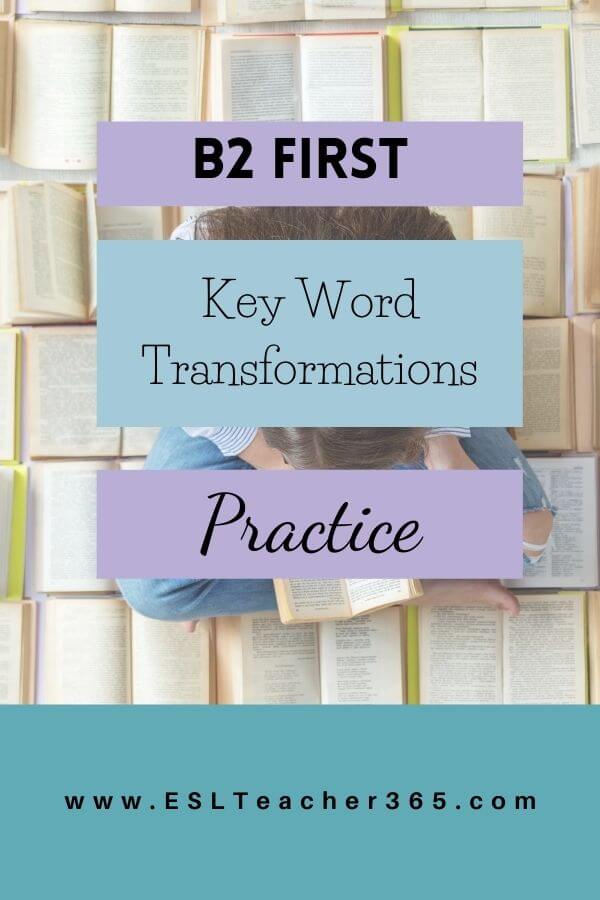
How to score your answers:
You can earn up to two points for each answer.
The two parts of the answer are separated by “ — “
If your answer to the left of the “–” is EXACTLY the same, give yourself one point.
If your answer to the right of the “–” is EXACTLY the same, give yourself another point.
Depending on your mistakes, you may earn 0, 1, or 2 points per answer.
- ONLY — WE HAD
- HAVE OUR TERRACE — REDECORATED
- NOT BRING A JACKET — UNLESS
- CAME ACROSS — THE RING
- I HAD — SOLD
- HAS NOT CHANGED — SINCE
- WERE NOT — ALLOWED TO
- WERE BUILT — BY
- IS LIKELY — TO COME
- (HIGH)* TIME — YOU DECIDED
*Words in ( ) are optional. You can still earn the full point for “time” if you didn’t write “high time.”
For more FCE Practice, try these posts.
- FCE Essay Writing Guide
- B2 Reading and Use of English Part 1
- FCE Speaking Exam Tips
ESL Teacher 365 Online Courses & Memberships
Teach online in 10 days mini-course.
A step-by-step 10 lesson mini-course that will teach you how to become an online teacher so that you can life a life of freedom & flexibility - with unlimited income potential!
TEFL Teacher Roadmap Teach Course
A proven step-by-step formula that will teach you how to move abroad with confidence & clarity. A self-study online course for anyone asking "NOW WHAT?!" after completiting their TEFL certificate.

Teach Abroad Club Membership
Ready to start your teach abroad adventure? Teach Abroad Club is the ONLY monthly membership & community that supports you through the teach abroad process - every step of the way.
Follow ESL Teacher 365
More posts from the blog.

8 Things You Should Look for in an International Teaching Contract
Jan 23, 2024
What should you look for when it comes to international teaching contracts? Find out in this guest post by Christopher Jacklin.

Effective Feedback in the ESL Classroom: Key Strategies for Success
Oct 12, 2023
Strategies for Feedback in the ESL Classroom – a guest post by RVF International.

Teach Abroad in China 2024
Oct 6, 2023
How to teach English abroad in China – a complete guide to visas, types of schools, salaries and benefits of teaching in China.

Thanks for visiting ESL Teacher 365!
Certified Teacher & Founder of ESL Teacher 365
I am passionate about helping people teach abroad & online so they can live a life of adventure !
I’ve taught in 6 different countries and love sharing my teach abroad (and online) tips and tricks.
The world is yours to teach and explore!
– Jamie
Disclaimer: ESL Teacher 365 participates in Amazon Associates and other afilliate programs. This means I may earn a small commission if you use one of my links, at no extra cost to you. This helps me continue to provide helpful resources for teachers. Thank you!

Cambridge English: First
Discover some of the common structures tested in the Use of English Key Word Transformations task
- Spotlight Paper 1
FCE Use of English: Part 1 | 2 | 3 | 4 |
About part 4 key word transformations.

You will be given a complete sentence followed by a second, incomplete sentence. You must complete the second sentence so that it has the same meaning as the first using a word given that must not be changed. There are 6 sentences in total. In the exam you transfer your answer to a special answer sheet. Part 4 tests your knowledge of grammar and vocabulary. It is impossible to predict areas that you could be tested on here. However, the categories listed below appear quite often. Key Word Transformation video tutorial
Now try our exercises

1. Comparative/Superlative Structures like so/such .., er/as ... as or too/enough often appear in this exercise. Online Exercise | Print Version
2. Passive Changes from active to passive or passive to active are often required. Online Exercise | Print Version
3. Direct and Indirect Speech You are sometimes asked to transform a sentence from direct speech to indirect speech or from indirect to direct speech. Online Exercise | Print Version
4. Auxiliary verbs You will often find questions that test your knowledge of auxiliary verbs like 'will', 'have', 'must' etc. Online Exercise | Print Version
5. Conditionals Any type of conditional sentence is likely to appear in this part of Paper 3. Online Exercise | Print Version
6. 'Unreal' past tenses You will sometimes find sentences using 'If only ...', 'I wish ...', I'd rather ...' etc that require the use of past tenses. Online Exercise | Print Version
7. Verb patterns Your knowledge of verb patterns such as gerund and infinitive is frequently tested. Online Exercise | Print Version
8. Phrasal Verbs Sentences requiring phrasal verbs often appear in this section. Online Exercise | Print Version
9. Practice In most of the exercises above you have had to make ONE change to the sentence, for example making an active sentence passive. However, in the exam you may have to make TWO changes to the sentence, for example changing active to passive AND using a phrasal verb. Online Exercise | Print Version
Dos and don'ts

Remember to put the prompt word in your answer and do not to change this word. Don't write more than five words (contractions, e.g. 'I'm', count as two words). Don't leave the answer sheet blank for any question. If you don't know the correct answer you should always make a guess.
How to improve
If you get a sentence wrong, rewrite the correct structure in a way that has personal meaning.
Try an online Reading and Use of English Part 4 (Key Word Transformations) test in the ' Practice Tests ' area.
FCE Info and Practice
Fce resources to buy.
Print off a mark sheet to keep a record of your scores.
When you've finished these exercises try an online Use of English Part 5 (Key Word Transformations) test in the 'Practice Tests' area.
Your Feedback
"I passed FCE, now I'm preparing to CAE. Thanks to all Flo-Joe's crew for creating this wonderful site." Anna Karbowska, CAE student Bolesawiec, Poland.
"I think this a very interesting place for people who wants to improve their English. For me this is the best one." Ariel Pertile, FCE Student, Argentina.
- Macmillan English
- Onestopenglish
- Blog & Resources
Paraphrasing at B2 First: or to put it another way…
by Roy Norris in Blogs & Articles
In this article, Roy Norris looks at paraphrasing in the Cambridge B2 First exam and shows how teachers can provide practice in this important subskill.
Paraphrasing in all four papers
When students are preparing for the Cambridge B2 First exam, there is a clear case for them to learn to express the same idea in a number of different ways , or in other words, to convey the same message in more than one way using a range of words and expressions , or indeed, to put it another way, to employ a variety of lexis and structures to communicate the same meaning. Paraphrasing is a skill which is tested, of course, in the Key Word Transformation exercise in the Reading and Use of English paper, but it is also very relevant in each and every one of the other three papers.
The five sentences from eight (A-H) which constitute the answers in Part 3 of the Listening paper, the multiple-matching task, often paraphrase the words of the speakers in the five short monologues. This may also be true of the questions in the multiple-matching task of the Reading and Use of English paper, Part 7. For the Speaking paper, we are encouraged, in the Cambridge English Qualifications: B2 First Handbook for teachers, to train students ‘to paraphrase when they do not know, or cannot remember, a word’. And in the Writing paper, students should avoid repetition and use a range of structures and vocabulary.
So, given the importance of paraphrasing throughout the B2 First exam, what can we as teachers do in our classes to develop this skill in our students? Firstly, there are certain activities which are specifically suited to some of the task-types mentioned above.
In Roy’s brand new course, Ready for B2 First, you will find new listening and reading texts with updated topics and tasks which make the course more contemporary and relevant to students' lives.
Preparing for Listening Part 3
Before tackling a Part 3 Listening task, for example, students could consider at least one alternative way of expressing the general idea contained in each of the eight sentences (A-H). ‘I don’t really care what clothes I wear’, might be expressed as ‘ I don’t mind what I put on’ or ‘I pick out the first shirt I come across in my drawer - it’s just not important to me.’ This type of prediction task will help prepare students for what they might hear in the recording and, whilst they may not have time to do this for all eight sentences in the actual exam (they are given just 30 seconds to read them), it provides valuable practice in the skill of paraphrasing. Then, once they have completed the listening task and are checking their answers, students can refer to the script and compare their own predictions with what the speakers actually say.
Paraphrasing unknown or forgotten words
The game of Taboo provides useful practice for the Speaking paper, as players have to define or explain certain items of vocabulary to each other without mentioning them, thus simulating situations in which they ‘do not know, or cannot remember, a word’. The task is made more challenging, and hopefully entertaining, by providing five further words which students cannot include in their definitions. The target item bake , for example, might be written on a card and accompanied by the following five words which must not be used: cake, oven, cook, potato, bread . Taboo is commercially available, but cards can easily be made by teachers and used to revise previously seen vocabulary.
Overused words
Students are often called upon in both the Speaking and the Writing papers to discuss how important, interesting, difficult or useful something might be. It is important (!) therefore, that we ensure they have a range of adjectives at their disposal to express these very common concepts without repeating themselves. An exercise such as the following might be useful (!); it includes synonyms for the four adjectives already mentioned, as well as a number of other common words which are often repeated by students.
Avoiding repetition
In each sentence 1 - 8 , complete the gaps with two words which have a similar meaning to the word which has been underlined.
absorbing attractive bothered concerned dull
essential fascinating tricky glad helpful indispensable
hard pleased practical picturesque tedious
1 It’s important to bring warm clothes, and a good pair of boots is _________ / _________.
2 I’ve just a really interesting book; the story’s _________ / ________ and it held my attention from start to finish.
3 I found the homework difficult. Everyone else found it _________ / _________, too.
4 Thanks for the useful tips. The advice you gave me is very _________ / __________.
5 I was very happy with the party. Are you _________ / _________ you came?
6 My cousin lives in a beautiful house in a very _________ / _________ village.
7 Paul was worried about the exam, but no one else seemed _________ / _________.
8 History lessons at my school are boring, and maths is just as _________ / _________.
You could then ask students to add one of the following, or similar adjectives to each group:
challenging crucial delighted handy intriguing monotonous stunning troubled
1 essential, indispensable + crucial 2 absorbing, fascinating + intriguing
3 tricky, hard + challenging 4 helpful, practical + handy
5 glad, pleased + delighted 6 attractive, picturesque + stunning
7 bothered, concerned + troubled 8 dull, tedious + monotonous
An integrated approach
In addition to activities with specific papers or task-types in mind, general work on paraphrasing can be integrated into any lesson throughout an exam preparation course, using suitable texts from your coursebook. These could include reading texts, listening scripts, model writing answers, or Use of English texts. The following extracts are taken from different speakers in a Part 1 Listening:
1 It’s not like him to talk much about his plans.
2 Everyone went out of their way to help me.
3 It doesn’t matter how tall or short you are.
You could deal with this orally and, with books open at the script, ask students to underline the target sentences and express each one in a different way. Or you could prepare a written exercise beforehand, giving students alternative versions of the target sentences and asking them to find each one in the script. For example:
Find the sentences in the script which mean the following:
1 He doesn’t usually say a lot about what he’s going to do.
2 They all made a big effort to be helpful.
3 Your height isn’t important.
Student records and revision
Either way, each pair – the target sentence and its paraphrase – should be recorded in the students’ vocabulary notebooks, preferably alongside each other, rather than one above the other. This then becomes a useful tool for revision; students can cover up the target sentences and try to remember them, looking only at the paraphrases, or vice versa.
You can also very easily provide your own revision exercises. These can take the form of Key word transformations, thus providing valuable exam practice as well as showing students the direct link between what they learn in class and how it might be tested in the exam. For example:
Use between two and five words to complete the second sentence so that it has a similar meaning to the first sentence. You must use the word in capital letters.
1 He doesn’t say a lot about what he’s going to do.
It’s …………………………… talk much about his plans.
Everyone …………………………… to help me.
If you feel that your sentence pairs do not lend themselves very well to the exam format, you could create an exercise in which students simply have to ‘complete each gap with one word so that the second sentence has the same meaning as the first’.
Your …………. isn’t important.
1 not like him to
2 went out of their way
The teacher’s role
As the Handbook for teachers says: ‘ The ability to express a message in a different way shows flexibility and resource in the use of language’. It’s up to us as teachers to ensure that our students have sufficient practice in this important subskill in order both to develop their language resources and to prepare them for the B2 First exam. Or to put it another way, it’s our job to make sure our students get enough practice in paraphrasing to help build their language skills and get them ready for B2 First.
Cambridge English Qualifications: B2 First Handbook for Teachers (April 2019), Cambridge Assessment English
https://www.cambridgeenglish.org/
About the Author

Roy Norris worked for many years as a teacher and teacher trainer at IH Madrid, and also spent nearly two years as Director of Studies in Vilnius, Lithuania. He has been writing for Macmillan since 1999, and is the author of Ready for B2 First (now in its 4th edition), Straight to First and Straightforward Advanced, and co-author of Ready for Advanced.
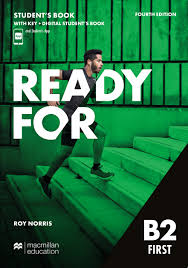
Ready for B2 First 4th Edition
Ready for life.
From the bestselling Ready for Series, Roy Norris is back with Ready for B2 First 4 th Edition
CLICK TO LEARN MORE!
Paraphrasing fce
Loading ad...
silvia santos
paraphrasing
- Google Classroom
- Microsoft Teams
- Download PDF
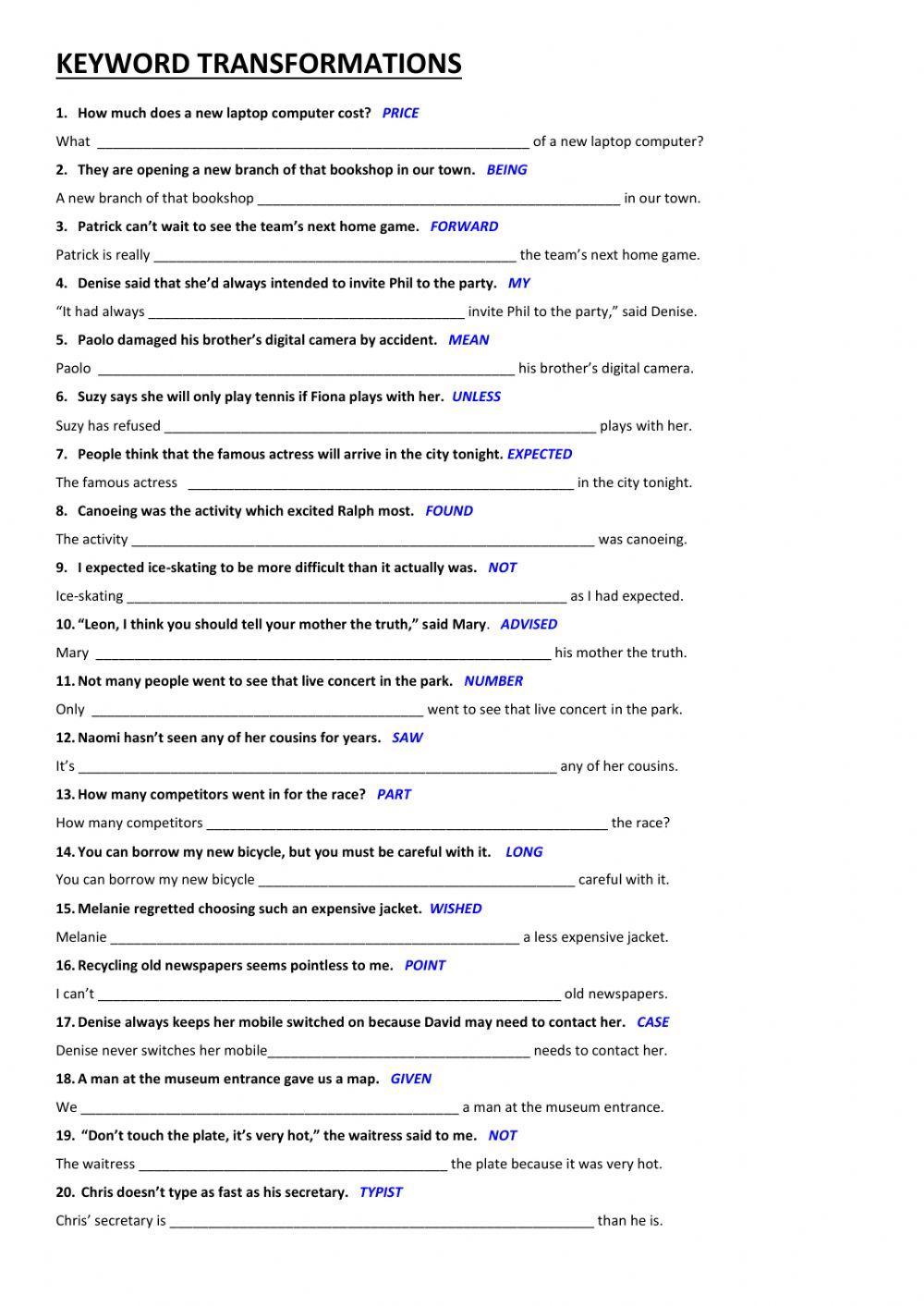
Breakout English

First (FCE) B2 Key Word Transformations – Reporting Verbs Exercise
Reporting verbs is a challenging grammar point at B2 level, but doing plenty of reporting verbs exercises can help. This grammar combines reported speech, which is nobody’s favourite, with verb patterns, which is really nobody’s favourite. Throw in using the reporting verbs in the past and you’ve got a messy lesson on your hands.
In the First Certificate exam, there often seems to be at least one key word transformations question with reporting verbs. So, like always, we need to prepare students for the eventuality of encountering it in the exam. Below, you’ll find 10 key word transformation questions for the Cambridge B2 First (FCE) Use of English Part 4. If you are looking for even more transformations to practise for the exam, consider picking up Breakout English’s book 250 Key Word Transformations for the B2 First exam.
GET 250 B2 FIRST (FCE) KEY WORD TRANSFORMATIONS:

Why do you need to know reporting verbs?
It is essential to familiarise your students with the unique structures that follow reporting verbs so that they can confidently and accurately use them in their exams. One effective way to do this is through drilling. This involves repeating the structures multiple times to help students internalise them. You can do this by repeating the phrases from your controlled practice activity in a course book or grammar book. Try drilling by building up the sentence from one word until it’s complete. Then break it back down. Drill fast, then slow, then quiet, then loud. It’s a fun activity and helps students with complex pronunciation and connected speech.
Another useful technique is to present your students with real-life examples of how the reporting verbs are used in context. This could involve reading articles or watching videos that contain examples of reporting verbs. Encourage your students to identify and highlight the reporting verbs in the text and discuss the structures that follow them. Youglish is an impressive tool to find words in context in YouTube videos. Just search for the phrase you want to see and it will find a series of videos using that word.
Incorporating role play activities can also be helpful. For example, students could take on the role of journalists reporting a news story, or characters in a scene discussing events that have taken place. After the role play, have students switch roles and share their findings. This forces them to used reported speech and reporting verbs. These reporting verbs activities not only provide students with the opportunity to practise using reporting verbs but also allow them to have fun while doing so.
Examples of reporting verbs
As you can see in the examples below, there are often multiple structures that can be used following different reporting verbs. They might be followed by a gerund, an infinitive, a preposition + gerund or a “that” clause. They might also require or not an object following the verb.
“We should go out on Saturday,” suggested Paul.
- Paul suggested going out on Saturday.
- Paul suggested (that) we go out on Saturday
“I didn’t see anything,” claimed Sarah.
- Sarah claimed not to have seen anything.
- Sarah claimed (that) she hadn’t seen anything.
“I’m going to quit my job,” announced Jane.
- Jane announced (that) she was going to quit her job.
- Jane announced quitting her job.
“I can’t make it to the meeting,” apologised Tom.
- Tom apologized for not being able to make it to the meeting.
- Tom apologized (that) he couldn’t make it to the meeting.
“I’ve never been to Paris,” admitted Lucy.
- Lucy admitted (that) she had never been to Paris.
- Lucy admitted never having been to Paris.
It’s important to note that some reporting verbs have a set structure that we must follow, while others can have more flexibility in terms of structure. It’s also important to be aware of the tense changes that might occur in the transformation from direct speech to reported speech.
Practice is key when it comes to mastering reporting verbs. Encourage your students to practise using different reporting verbs and structures in various contexts to help them feel confident and comfortable with this grammar point.
There are no hard and fast rules to tell your students which verbs have which patterns, so use your course book or a nice grammar explanation like this one from perfect-english-grammar.com .
The Materials
Once your students have a grasp of the grammar, they need practice! That’s where the reporting verbs exercises on this page come in. Get as much practice as possible using reporting verbs in an exam format.
Here are 10 transformations for your students to practise. This reporting verbs exercise will help you and your students visualise how reporting verbs are used in the Cambridge B2 First (FCE) exam. I often like to search some past papers to find a real exam with an example too, just to prove to doubtful students that they do and may well pop up.
EXAM PART : Use of English Part 4
EXAM SKILLS : Using grammar appropriate to the level (B2), key word transformations
TIME: 20 minutes + feedback
PREPARATION: One copy of the worksheet per student
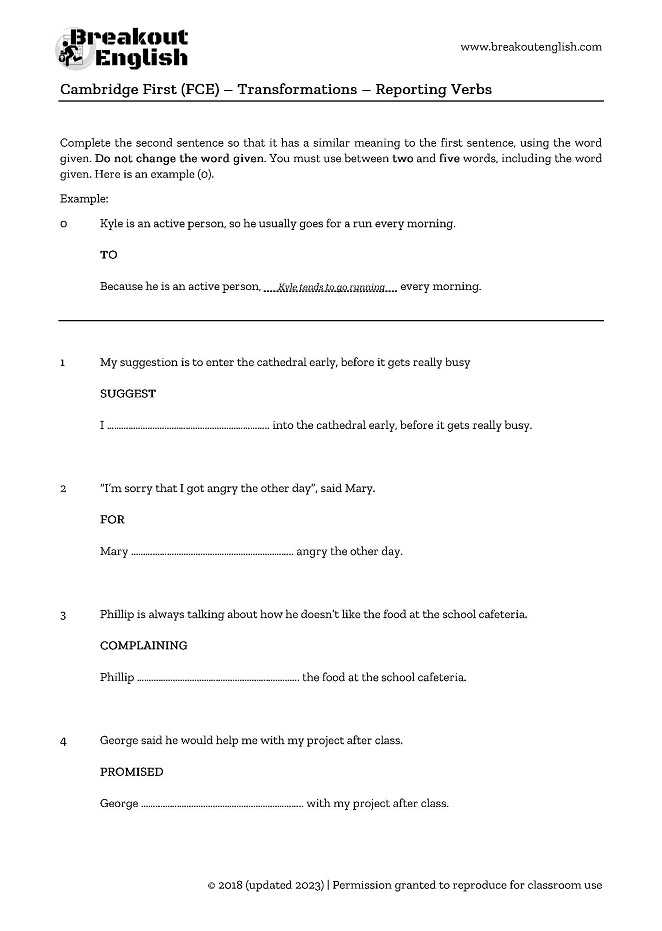
English Practice Downloadable PDF Grammar and Vocabulary Worksheets
Key word transformation (b1).
- KWT009 - Key Word Transformation
- KWT008 - Key Word Transformation
- KWT007 - Key Word Transformation
- KWT006 - Key Word Transformation
- KWT005 - Key Word Transformation
- KWT004 - Key Word Transformation
- KWT003 - Key Word Transformation
- KWT002 - Key Word Transformation
- KWT001 - Key Word Transformation
- Adjective - Adverb
- Gerund and Infinitive
- Modal Verbs
- Reported Speech
- Passive Voice
- Definite and Indefinite Articles
- Quantifiers
- Relative Clauses
- Prepositions
- Questions and Negations
- Question Tags
- Language in Use
- Word Formation
- General Vocabulary
- Topical Vocabulary
- Key Word Transformation
News Articles
- Letters and Emails
- Blog Posts and Comments
- Connectives and Linking Phrases
- Phrasal Verbs
- Collocations and Phrases
Listening Comprehension
Privacy policy.
profesor-de-ingles-en-leganes
Helping you all the way.
Please note : The titles below are available only in e-book format.

These ebooks contain 50 Key Word Transformation exercises each. Using the "key word", students are expected to complete the second sentence so that it has a similar meaning to the original sentence.
The Key Word Transformation is part 4 of the use of English paper. In order to pass this task , students must be able to recognize what they are being tested on. For example, they need to know when they have to use the passive voice, a causative verb, modals of speculation, a conditional tense, etc.
The exercises in these two ebooks test the most common grammatical structures that students need to know in order to pass part 4 of the Use of English paper of the Cambridge English : B2 First (FCE) examination.
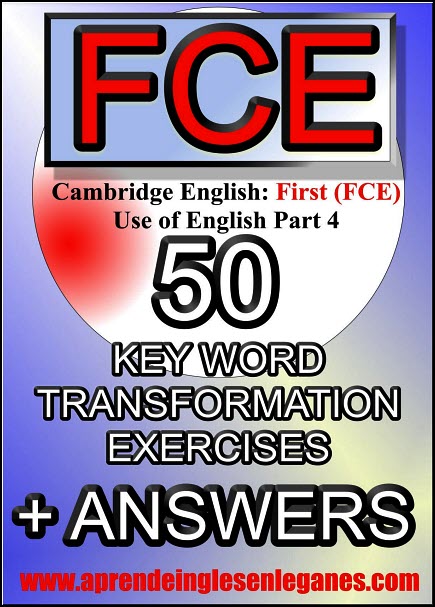
These ebooks contain 50 Key Word Transformation exercises each . Using the "key word", students are expected to complete the second sentence so that it has a similar meaning to the original sentence.
The Key Word Transformation is part 4 of the use of English paper. In order to pass this task , students must be able to recognize what they are being tested on. For example, they need to know when they have to use the passive voice, causative verbs, conditional sentences , inversions, inverted conditionals, set phrases, phrasal verbs, linking words, etc.
The exercises in these ebooks test the most common grammatical structures that students need to know in order to pass part 4 of the Use of English paper of the Cambridge English : C1 Advanced (CAE) examination.
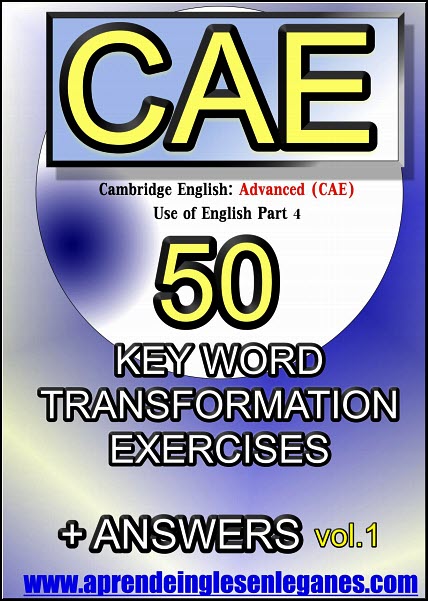
The Key Word Transformation is part 4 of the use of English paper. In order to pass this task , students must be able to recognize what they are being tested on. For example, they need to know when they have to use the passive voice, causative verbs, conditional sentences, idioms, set phrases, collocations, inversions, inverted conditionals, linking words, etc.
The exercises in these ebooks test the most common grammatical structures that students need to know in order to pass part 4 of the Use of English paper of the Cambridge English : C2 Proficiency (CPE) examination.
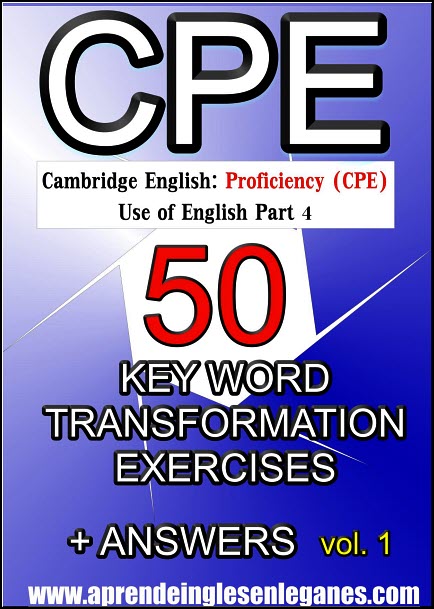
This ebook will help you get better at doing key word transformation exercises.
It contains 50 of the most difficult-to-paraphrase sentences at C2 level.
The exercises in this ebook have been chosen from the most common mistakes made by students who were preparing themselves to take the Cambridge English: C2 Proficiency examination.
In the key word transformation task, your knowledge of C2 vocabulary and grammar is tested. You have to show command of advanced phrases, phrasal verbs , idioms, adjectives, nouns, collocations, etc., to pass this part of the exam.
It is always advisable to make a list of the new words, phrases, idioms, etc., you come across so that you can remember them in the future.
key word transformation practice exercises, key word transformation exercises with answers, 100 key word transformation pdf, key word transformation exercises pdf, sentence transformation exercises with answers pdf, key word transformation c1, transformation sentences exercises ,fce key word transformation exercises with answers pdf, c2 proficiency - key word transformation made easy pdf, b2 first key word transformation, c1 advanced key word transformation, cpe key word transformation, cae key word transformation, key word transformation gerunds and infinitives answers, key word transformation passive and causative, key word transformation examples
Make a free website with Yola

IMAGES
VIDEO
COMMENTS
Key Word Transformation (B2) KWT005 - Key Word Transformation. KWT004 - Key Word Transformation. KWT003 - Key Word Transformation. KWT002 - Key Word Transformation. KWT001 - Key Word Transformation.
Free practice exercises to help you improve and pass the exam. Get better at Key Word Transformations and pass the B2 First exam. Free practice exercises to help you improve and pass the exam. ... A good way to practise this part of the FCE exam is to get used to writing and re-writing sentences using different structures and without changing ...
Practice makes perfect - Do as many key word transformation exercises as you can. You can use official Cambridge B2 First materials or our book with 250 FCE key word transformations. Don't get stuck - If you're spending too much time on one, move on to another and come back later. Relax - Stay relaxed and focused during the exam ...
B2 Key Word Transformation KWT005 Complete the second sentence with TWO to FIVE words using the word given, so that it has a similar meaning to the first sentence. 1. He couldn't concentrate on his exam because of the noise. (SO) It was _____ couldn't concentrate on his exam. 2. I haven't received an answer yet. (STILL)
B2 First (FCE) Use of English Part 4: Tips & Strategy B2 First (FCE) Use of English: Part 4 question type here is called key word transformation.. You must complete a new sentence that has a similar meaning. You use a word in capitals given in bold for each sentence, which you must not change.. Strategy. Read the sentence carefully and think about its exact meaning.
The Key word transformation tests a wide range of different grammatical structures and vocabulary. You must show your ability to paraphrase using the key word and, most importantly, keeping the meaning the same. The difficulty lies on the great variety of grammatical structures that you need to learn in
We've put the key word transformations from this page and loads more in a book that's available for digital download and as a paperback on Amazon. GET 250 B2 FIRST (FCE) KEY WORD TRANSFORMATIONS: Learn more. Digital - €8.95. Paperback - Amazon.
B1 Key Word Transformation KWT009 Complete the second sentence so that it has a similar meaning to the first, using the word given. Use between TWO and FIVE words. 1. My boyfriend really likes football and never misses a match. (CRAZY) My boyfriend _____ football and never misses a match. 2.
B2 First - Key Word Transformations Exercise 1. In these exercises, you need to take the information in the first sentence and re-write it, using the word in bold so that the second sentence has exactly the same meaning. You cannot change the word in bold in ANY way. You must use a minimum of TWO and a maximum of FIVE words for each space.
Phrasal Verbs. For Questions 1-8, complete the second sentence so that it has a similar meaning to the first sentence, using the word given. Do not change the word given. You must use between two and five words, including the words given. 1) I'm excited about the holiday.
Common mistakes on FCE Key Word Transformations. Changing the key word - you MUST use the exact word ; Using too many words - maximum of 5 words; Spending too much time - if you don't know the answer, take a guess and continue with the next question; Pronoun gender and agreement-if the first sentence uses a name, try to use the name in your second sentence.
Direct and Indirect Speech. You are sometimes asked to transform a sentence from direct speech to indirect speech or from indirect to direct speech. 4. Auxiliary verbs. 5. Conditionals. Any type of conditional sentence is likely to appear in this part of Paper 3. 6. 'Unreal' past tenses.
Cambridge English: First (FCE) ... KEY WORD TRANSFORMATION EXERCISES . 1. is not old enough 2. if you could look after 3. didn't succeed in saving 4. been to the cinema for 5. was not aware 6. decided to cut down on 7. never met such an interesting 8. may have lost 9. must not have meant
Good practice for FCE exam. School subject: English as a Second Language (ESL) (1061958) Main content: Paraphrasing (2010070)
Give out Worksheet #3 Paraphrasing. Go through the four rules at the top of the page. 1) Highlight key words. 2) Find synonyms. 3) Rewrite Grammar. 4) Check meaning. Go through the first example as a class. (Look at answers before the class and highlight each stage). 1 elicit key words in the sentence. 2) ask the students to find four synonyms ...
Paraphrasing in all four papers. When students are preparing for the Cambridge B2 First exam, there is a clear case for them to learn to express the same idea in a number of different ways, or in other words, to convey the same message in more than one way using a range of words and expressions, or indeed, to put it another way, to employ a ...
Reported Speech (Indirect speech) FCE - SENTENCE TRANSFORMATION. MGregorio
This comparatives and superlatives exercises worksheet contains 10 sentences where you will be required to transform the given sentence using the appropriate comparative or superlative form. These types of Key Word Transformations often appear in the Cambridge B2 First (FCE) exams. While comparatives and superlatives are simple to understand ...
Liveworksheets transforms your traditional printable worksheets into self-correcting interactive exercises that the students can do online and send to the teacher. ... Paraphrasing fce ... School subject: English as a Second Language (ESL) (1061958) Main content: Key word transformations (2011907 ) ...
If you are looking for even more transformations to practise for the exam, consider picking up Breakout English's book 250 Key Word Transformations for the B2 First exam. GET 250 B2 FIRST (FCE) KEY WORD TRANSFORMATIONS: Learn more. Digital - €8.95. Paperback - Amazon.
Key Word Transformation (B1) KWT009 - Key Word Transformation. KWT008 - Key Word Transformation. KWT007 - Key Word Transformation. KWT006 - Key Word Transformation. KWT005 - Key Word Transformation. KWT004 - Key Word Transformation. KWT003 - Key Word Transformation. KWT002 - Key Word Transformation.
C1 Advanced - 50 KWT EXERCISES Vol. 4 €6,99 EUR. These ebooks contain 50 Key Word Transformation exercises each . Using the "key word", students are expected to complete the second sentence so that it has a similar meaning to the original sentence. The Key Word Transformation is part 4 of the use of English paper.
Effective paraphrasing does NOT equate to replacing key words of the passage with synonyms, rearranging words, or re-ordering and re-structuring sentences directly from the passage.